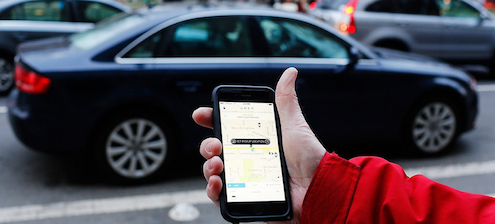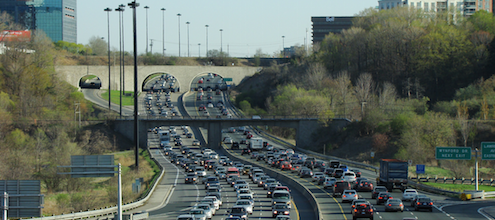
Uber traffic: Ride-sharing offers new opportunities for comprehensive congestion pricing
The ride-sharing debate is alive and well in B.C. The provincial government is holding a series of public hearings about whether, and under what conditions, ride-sharing services should be allowed. Amid questions about passenger safety, impacts on the taxi industry, and personal mobility, there are concerns that ride-sharing could also make traffic worse in Metro Vancouver (sigh). If so, is there a way to have ride-sharing and prevent traffic from going further off the rails? We think there is: congestion pricing.
The ride-share holdout
British Columbia is one of the last holdouts for ride-sharing services. Companies like Uber are active in over 507 cities in 66 different countries. They have 200,000 registered users in B.C., ready to ride if given the green light (full disclosure, I’m one of these 200,000). Vancouver is now the largest city in North America without the service.
This could all change in 2018. All three provincial political parties supported ride-sharing services on the campaign trail; the Greens introduced a bill to legalize it three different times. The recently-elected NDP government is now holding public hearings on how ride-sharing might affect the province and how best to regulate it.
Concerns that ride-sharing will make traffic worse in Metro Vancouver came up multiple times in the hearings. Part of ride-sharing’s appeal is that it’s cheaper and more convenient than driving, walking, cycling, or taking transit. Cheaper travel, in turn, encourages people to make more trips (by car) and results in more vehicles on the road and more kilometres travelled. While ride-sharing might encourage people to ditch their cars in the long term, recent evidence suggests that this hasn’t happened yet.
Seeing the traffic for the cars
The prospect of making congestion worse in Metro Vancouver should not be taken lightly. Congestion is already a maddening, unpredictable battle for many commuters. Having a better understanding of how ride-sharing might impact Metro Vancouver is a crucial first step.
But understanding the potential impacts on traffic is only the starting point. The broader conversation about how to deal with the region’s congestion is more important than focusing narrowly on ride-sharing.
Thankfully, this conversation is well underway in Metro Vancouver. An independent commission is assessing how congestion pricing could be a long-term solution for the region’s traffic woes. Details on different pricing options and how they might impact different parts of the region are coming this spring. (See here for the Commission’s interim report.)
Improving mobility is the goal
Congestion pricing (aka mobility pricing or decongestion charging) can take many forms, but it ultimately charges motorists more to drive at busy times or locations when traffic is worst. In Metro Vancouver, it could mean tolling all of the region’s bridges and tunnels. Or it could mean a more comprehensive charge based on the time and distance of each trip. In any case, congestion pricing encourages people to travel at different times of the day. It also encourages fewer trips or pooling together to reduce the cost.
Ride-sharing could mesh nicely with congestion pricing in Metro Vancouver. Providing that ride-sharing trips can’t skirt the congestion charge, the extra cost could simply be added to the passenger’s bill. If the bridges are tolled, for example, riders would see the additional crossing fee, just like other drivers.
These extra fees wouldn’t be for nothing. Congestion pricing—if done right—would help ease traffic and make trips faster. Ride-sharing could even give people more options in how they respond to congestion, which is probably why ride-sharing companies support congestion pricing. The new revenues could be recycled back to residents through a cut in the sales tax, a cash dividend, or infrastructure upgrades.
Getting technical
The recent explosion of ride-sharing and car-sharing services also shows that the technology for distance-based congestion pricing is already here. Car2Go, Evo, Uber, and Lyft each use GPS-based technology that charge people based on the time and distance travelled. A pilot project in Oregon uses this technology to charge drivers based on time and distance instead of through fuel taxes.
Some ride-sharing apps (most notably Uber) even use peak pricing in setting rates. This is akin to having congestion charges based on traffic volumes: making it more expensive to drive at peak times and cheaper during off-peak times. (Anecdotally, Uber’s peak pricing encouraged me to use transit or bike in Ottawa when my trip wasn’t urgent.)
The long-term fix: Congestion pricing
Ride-sharing can enhance personal mobility and reduce travel costs, but it could also make congestion worse in Metro Vancouver. This could mean more time sitting in traffic, more pollution, and more wear and tear on our infrastructure.
It doesn’t have to be this way. Momentum for both ride-sharing services and congestion pricing are building in Metro Vancouver. It’s now a matter of integrating these two ideas in a coordinated and comprehensive approach. This could be a lasting solution to reducing traffic and improving our mobility.
Online course: Municipal market-based tools for sustainable development Sign up now for this new and unique Ecofiscal course, designed for municipal employees.




2 comments
Ridesharing should also reduce parking congestion.
Presumably congestion pricing would consider Zero-emission vehicles?
Thanks for your feedback, David. You’re right, ridesharing could reduce the need for parking and therefore reduce the time spent circling to find a parking spot.
Depending on how it’s designed, congestion pricing could incorporate vehicle emissions into how each driver pays; however, emissions are only one part of the problem. The bigger problem is the impact each driver has on the overall level of traffic — even low emissions vehicles would contribute to congestion.
Comments are closed.